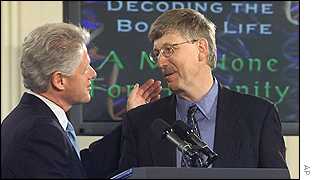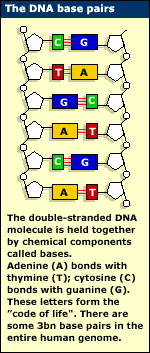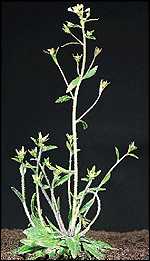
The End of the Beginning
URL: http://news.bbc.co.uk/hi/english/sci/tech/newsid_1100000/1100726.stm
Date accessed: 11 February 2001
Friday, 5 January, 2001, 13:49 GMT
It will be several weeks yet before the research which brought us a "rough draft" of the human genome finally gets published - almost a year after scientists stood side-by-side with world leaders to announce the landmark achievement.
You could say that we are really at the end of the beginning of
genomic research. We're certainly not at the end
|
|
Dr Francis Collins
|
A disagreement over the way privateers Celera Genomics intend to release their DNA sequence data through Science magazine has prompted the publicly funded effort to concentrate their papers in the journal Nature.
Little spats aside - and we have got quite used to them now - there should be some more hand-shaking and celebration when the not-quite-finished "book of life" gets its first, major scientific review in the spring. And then? Well, then the work simply goes on.
Scientists need to find out exactly how many genes are hidden in the three-billion-letter-long DNA sequence of humans. And they need to find out how the genes interact both with each other and with their environment.
Gene discovery
Dr Francis Collins, Director of the National Human Genome Research Institute at the National Institutes for Health, the man who has led the US public effort, predicts this work will take many years - perhaps even all of the 21st Century.
 |
As this work continues, the data from the publicly funded project are published daily on the internet. This means that researchers all over the world can immediately access the information and start using it in their own studies. And, according to Dr Collins, the data flow is having a huge impact on the rate of scientific discovery.
"I keep a tally of the genes that are responsible for human diseases that are identified over the course of a year. In a good year, in times gone by, there might have been two or three. Last year, there have been 29 discovered."
Crucial to this endeavour are the completed sequences of other organisms - yeast, a roundworm, the fruit fly and the soon to be completed lab mouse, to name just a few.
Tricky questions
"These comparisons allow us to identify the part of the human 'script' that is most important because it is going to be the part that is most similar between most organisms," Dr Collins said.

Even the recently decoded thale cress will help us understand
the human genome
|
But with the huge advances in knowledge come some tricky ethical questions: what exactly is an "error" in a person's genome and what sort of corrections should be allowed - assuming this is possible?
"I think one can argue that it is not only ethical to try to use genetics to cure terrible diseases, it would be unethical to stop the effort on the basis of fear of misuse in other situations," Dr Collins said.
"But when you move beyond the treatment of a severe disease, to something that sounds perhaps more like a genetic enhancement, I think everybody starts to get uneasy.
"Unfortunately, there is no bright line between those categories, which will make trying to set boundaries somewhat difficult and challenging. The technologies to do certain things are not with us yet, so we have a little time to deliberate about it."
Category: 32. Genome Project